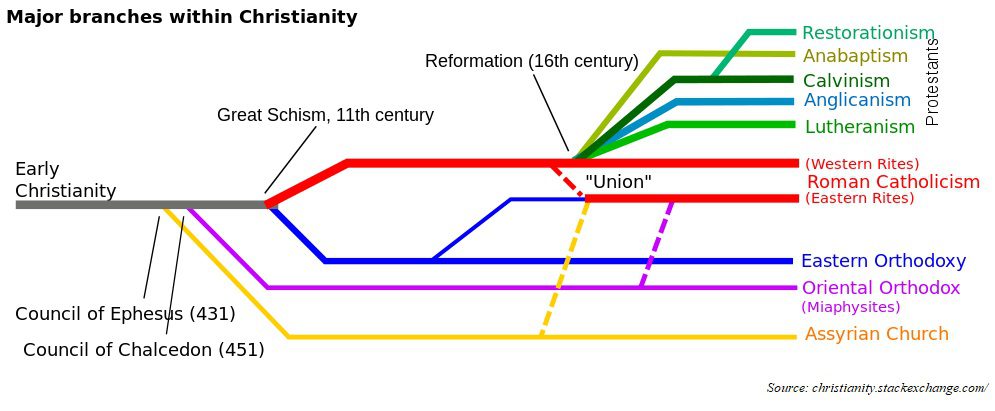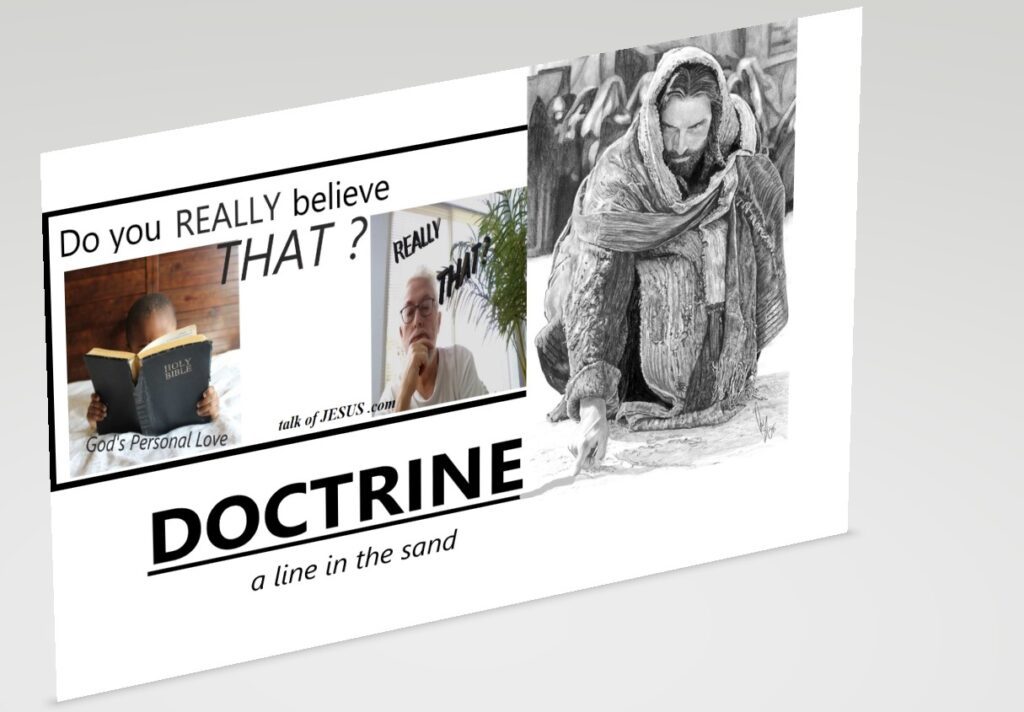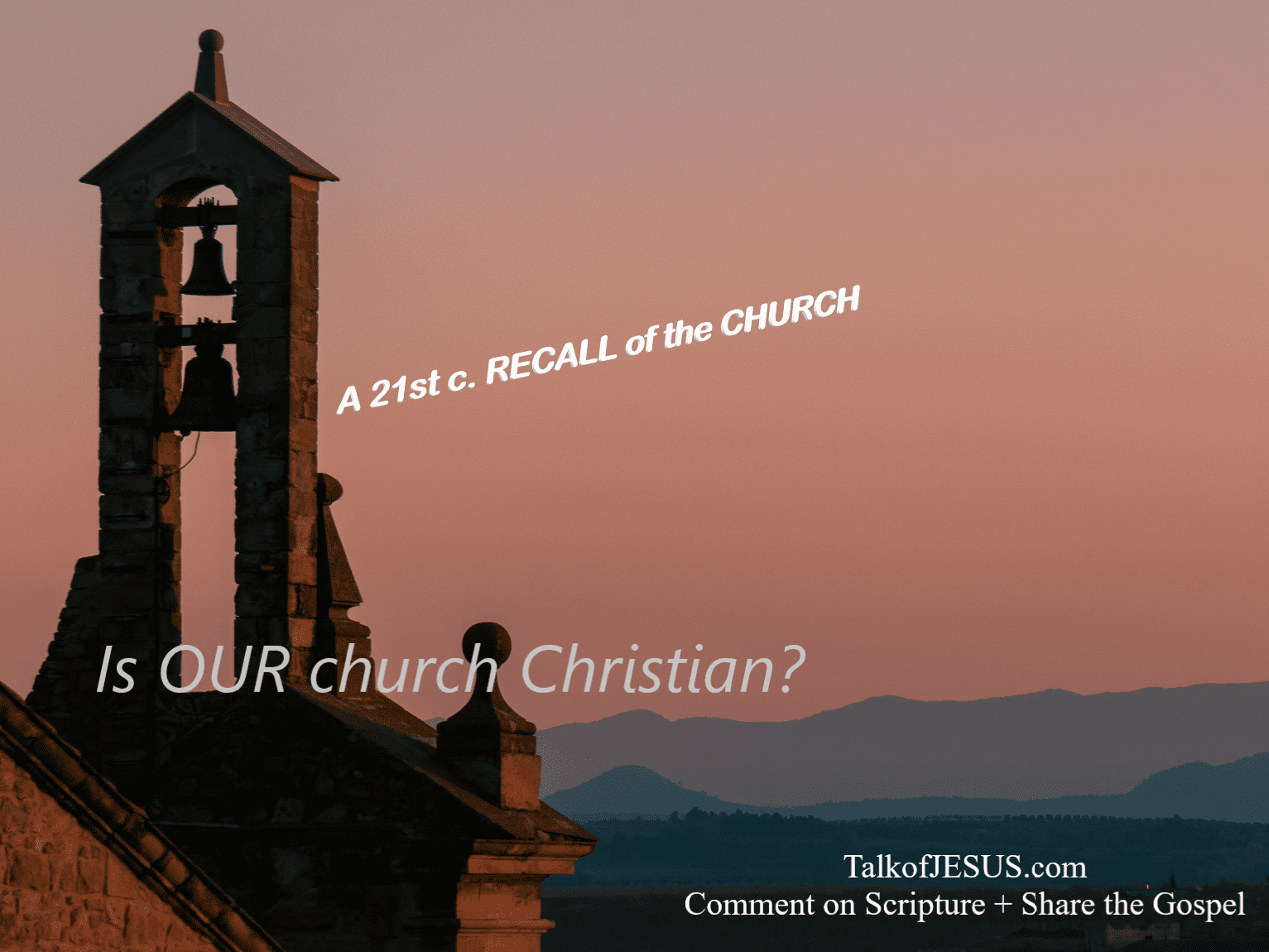What makes a church Christian? Can we tell from it’s SIGN on the DOOR or internet invitation? Does a traditional denomination make a church Christian? OR does its NAME etched in its brand guarantee preaching of Biblical Christianity?
Defining & Refining CHURCH Labels
As we observed last time concerning labels like ‘evangelical Christians,’ labels don’t generally describe individuals accurately. So too, the names of local churches may appear to be faded remnants of the past or clouded virtual pictures.
Today, however, we will address the body of believers who evangelize the Lord Jesus Christ, those we corporately we call ‘THE CHURCH.”
Church
So how is a godly Christian to know if OUR church preaches the Lord Jesus Christ according to Biblical Christian teaching of two millennia since the resurrection of Christ Jesus?
We have no idea what communicable doctrines a local church may preach, teach and spread into our local and distant communities.
Who are those Christians in that building?
I've even wondered this myself about our local gathering of christians and others in weekly worship, social gatherings (formerly called fellowship {archaic}) and sermon discussion classes (formerly labeled Sunday school {also archaic}) or Bible study {an inappropriate label for any group in a church willing to grow our church vision of Evangelicalism}.
Who are those christians in our church this week:
- Members?
- Attenders?
- Seekers?
- Unbelievers
How many of them are there?
Did they applaud the music?
What do they do when it’s not Sunday?
Will they bring someone else next week? (After all, that’s what evangelical christians are supposed to do.)
And what was it that preacher said? …
Let’s sort out a few common terms before proceeding further.
Definitions are my own. Accompanying questions are my personal musings about these same 'religious' terms. Dictionary definitions (sometimes linked to source) typically include various shades of grey [gray] as is so popular in a world of tolerance accepting many truths - truths which cannot all be true. As you may or may not realize: DICTIONARIES provide varying definitions of 'religious' terms which often illustrate editor bias against the LORD GOD and JESUS CHRIST.
CATHOLIC, Orthodox & Protestant
- Catholic – In a word, Universal or Everybody, but generally used exclusively to mean ROMAN Catholic Church under universal authority of the Bishop of Rome (THE Pope).
- Orthodox – Generally viewed as VERY culturally TRADITIONAL worshipers in various Eastern regions, i.e. Russian, Greek; also Jewish, (even Sunni Muslim!) (more)
- Protestant – They protest against:
- Catholics (mostly),
- authority (generally),
- other denominations (frequently) and
- the sins of others (especially) who ought to become more like them.
Christianity is the world’s most popular religion – with over 2 billion followers. Christianity is the main religion in Northern America, South America, Europe, and parts of Australasia and Africa. Christianity has recently been seen as a religion that acts as a bastion of peace – though tragically, Christians are officially the most persecuted people worldwide.
GENERATION95 with list of the 10 largest denominations
Does this help? Do you have your own take on Catholicism, Orthodoxy or Protestantism to SHARE in a COMMENT (please)? Now that we have outlined the BIG divisions of religions, let's get into some of the CHURCH NAMES (denominations, etc.)

Protestants / Divided
Partial List: Protests of Protestants tend to lead to exponential multiplication of church names ~ (add 'ism' for its religion name)
- Lutheranism (You know, followers of that Protesting Catholic who famously nailed 99 PROTESTS demanding Reformation.) – 16th c. German
- Moravianism – 15th c. Bohemian Reformation (before Luther)
- Calvinism – 16th c. France – God is King and the Bible’s authority reigns over kings (and church leaders)
- Anglicanism – 16th c. England, founded by Henry VIII,
- further advanced in 17c. by King James (of Bible fame)
- (Episcopalism – US after their 18th century secession from the King of England)
- Puritanism – 17th c. Puritans (kicked out of England) desired to further refine the reforms of the Protestant Reformation
- Quakerism (Friends) – 17th c. England (Anglican dissenter), George Fox evangelizes in the Colonies
- Methodism – 18th c. English missionaries, the Wesley’s, evangelizing colonies in America
- Pentecostalism – 20th c. America, incl. Holiness Pentecostals, Assemblies of God & others
- Presbyterianism – 18th c. Scotland – Presbyters (select Elders) run the church, not Bishops
- Baptists – (‘Baptism‘ better-defined; Many ‘isms’ emerge from the waters of the Baptists.)
- Anabaptists – 16th c. Dutch, including Mennonites and Amish
- Adventism – 19th c. – Worship on Sabbath (Seventh Day), Jesus is coming soon (i.e. Millerites)
Protestant Denominations
I’ve attempted a BRIEF personal impression of ‘major’ Protestant Denominations (divisions of theological thought). For more information view my source for most: Protestantism and open additional link to Major Branches.
BUT don’t let that SIGN on your Local Church mislead you.
There is much more to Protestant theology (the study of God) than simply knowing what denomination a local church promotes. (That’s why choosing a local church can be so confusing.)

Where do Protestant Denominations draw their lines in the sand?

- Evolving Revelations of God?
- Several compatible truths?
- Limited application of the Bible?

- Is the Bible infallible?
- What translation is accurate?
- Can a preacher paraphrase the Bible?
- Does God speak through the words of Scripture or the ideas of Scripture or perhaps both?

How does the Holy Spirit impact worship?

Where does Evangelicalism fit into a contemporary culture of Christianity?
Evangelicalism
It’s NOT a denomination or limited to certain Protestant churches. In fact, Evangelicalism is a movement within Christianity not unlike the charismatic and neo-charismatic movements of the twentieth and earlier centuries. And like any movement – religious, political or cultural in nature, its course continually alters.
I make no claims of expertise on Evangelical Christianity, but defer mostly to one of two sources in what is to follow: Evangelicalism from multiply-sourced Wikipedia and EVANGELICALISM DIVIDED - A RECORD OF CRUCIAL CHANGE IN THE YEARS 1950 TO 2000, by Iain H. Murray. - RH
Anyone born in the late 20th century or 1950’s as I was will likely picture one preacher as an icon of Evangelism: Billy Graham.
Graham was a Southern Baptist, but listen to his statement to an audience at the principle Roman Catholic University in the United States:
I have no quarrel with the Catholic Church.
Billy Graham, at Notre Dame, 1978
Evangelical Christianity
The secularism of Christianity and the Church is one of the evil tendencies of the day, and is one phase of universalism which the church is now called upon to oppose.. The Papal Church once sought to make Christianity a universal religion by adopting Pagan rites and ceremonies.
Wm G. T. Shedd, The Presbyterian Review, 1886 – source – ix
Evangelicalism is by no means non-controversial. - RH
‘We should be asking: What is a Christian? How can we get forgiveness of sins? and What is a church?’
D. Martyn Lloyd Jones – Evangelical Alliance Conference, 1966- source
Evangelists – εὐαγγελιστής
Evangelists preach the GOSPEL! Tyndale, of 16th century English Bible fame, called these evangelicals ‘gospellers.’
all the churches of the Reformation were ‘of the gospel’ in their creeds and confessions..
by 18th c. ..there were may pulpits from which no gospel was heard and when the evangel was recovered a term was necessary to distinguish its preachers from others.
They were the evangelicals.
EVANGELICALISM DIVIDED – p.1
It explains much. Even though your CHURCH or Protestant Denomination may claim to orthodox Christian doctrine like the Anglicans and Presbyterians of the 19th century, your local church pastor may not preach the Gospel. Your local preacher may not even be a Christ-believing shepherd and preach from a vision of his own rather than the Good News of the Bible. - RH
Such a divide away from evangelicalism lies in the tempting of certain preachers to veer away from Scripture toward modernist philosophies questioning God’s sovereignty over the free-will of humankind.
Experience, not teaching, has to be the object of the preacher, ‘the real thing in the religious discourse is an imparting of the religious consciousness’.
Evangelism Divided, p.11, citing an author separating biblical revelation from Christian feeling

Belief is NON-essential for christian worship. (Perhaps Jesus will give everyone a saving grace later.)
‘an atheist who lives by love is saved by his faith in the God whose existence (under that name) he denies.’
William Temple, Anglican Archbishop of Canterbury, 1934, – source p.12
- How can evangelicalism be said to represent Biblical essentials?
- IF one regards as Christians
- AND works alongside with
- those who actually DENY these essentials [gospel belief]?
- How can Christian fellowship exist independently of any common commitment to such belief?
- An Evangelical is a person who believes truths essential to salvation and has experienced their power in his own rebirth.
Here is the great divide. The ecumenical people put fellowship before doctrine.
We are evangelicals; we put doctrine before fellowship.
Lloyd-Jones, Evangelical Unity: An Appeal – source pp. 45-46
And they were continually devoting themselves to the apostles’ teaching and to the fellowship, to the breaking of bread and to the prayers.
Acts of the Apostles 2:42 Legacy Standard Bible
Further Division
I believe that there is an intolerance of plain, sober, instructive Christian teaching from the pulpit, which is one of the worst signs of the Christianity of this generation.
Alexander MacLaren :: A Fourfold Cord (Acts 2:42) [MacLaren was a Baptist preacher in 19th c. England]
Iain Murray, Presbyterian preacher at 2000 member National Evangelical Anglican Congress, Nottingham England - 1977
- What if the first need of the Church and the nation was not Christian unity but the recovery of Christianity itself?
- In that case the question, ‘What is a Christian?’ demanded a very different order of priority. p.150
When churches loose their influence, when the Christian message ceases to arrest the indifferent and the unbelieving, when moral decline is obvious in places which once owned biblical standards — when such symptoms as these are evident, then the first need is not to regroup such professing Christianity as remains.
It is rather to ask whether the spiritual decline is not due to fundamental failure to understand and practise what Christianity really is.
Iain H. Murray, Evangelism Divided – Retrospect: A Different Approach p. 151
The urgency of our wrong retrospect on what Evangelical Christianity really is seems even more pressing for the 21st century 'evangelical christian' forty years after Murray stated its importance. Roger@TalkofJESUS.com
Revival of Evangelicalism
Murray continues to make his case for Biblical Evangelical Christianity, a case with which I whole-heartedly agree. – RH
But if the New Testament does settle the question, then we have no liberty to redefine, ‘Christian,’ in terms which neither Christ nor his apostles ever authorized.
source p. 151
Paul writes in his first letter to Timothy of “God our Savior,” who desires all men to be saved and to come to the full knowledge of the truth. – 1 Timothy 2:4 LSB
Peter asks new-born Christians (that is, born-again Christians) to ‘long for the pure milk of the word, so that by it you may grow in respect to salvation, if you have TASTED THE KINDNESS OF THE LORD [pointing also to Old Testament Scriptures]. – 1 Peter 2:2b-3
THEN, as Murray points out: This precious value, then, is for you who believe. – 1 Peter 2:7a AND from the Gospel of Luke 14:26 with the Lord Jesus instructing his Apostles in the cost of discipleship: “If anyone comes to Me, and does not [by comparison] hate [family we love]..even his own life, he cannot be My disciple.
Murray continues to make a Scriptural case for Evangelical Christianity.
WHY would any 21st century Evangelical Christian imagine any other way to evangelize the Gospel of our Lord and Savior Jesus Christ WITHOUT accurately pointing to the BIBLE?
On the basis of these facts [Scriptures listed by Murray] the New Testament shows that one sure test of a Christian profession is how that person reacts to the Scriptures.
Evangelism Divided – A Record of Crucial Change in the Years 1950-2000 – Iain H. Murray
Evangelizing the Pulpits of ‘Evangelicals‘
I offer here one closing thought to preachers in the pulpits of our 21st century Christian, Protestant Churches who belatedly have a ‘come to JESUS moment’ in considering the many Scriptural examples of evangelicalism.
Orthodox Evangelicalism
Looking for something to preach that will evangelize unbelievers to become members of your local church?
Preach Scripture (as written).
GOD has more credibility than YOU. So if you want to draw more worshipers to Jesus Christ, PREACH JESUS CHRIST from Scripture. It’s our most orthodox method to bring fellow sinners into our church.
Orthodox – definition
IF you read some 21st century definitions of Church, Catholic, Protestant, Orthodox, Evangelical, and OTHER religious terms, you may discover bias of a world listing it as archaic.
Orthodox faith in Jesus Christ from the Bible remains constant even during tides of contemporary ‘christian‘ movements.
Webster’s 1913 Dictionary offers an enduring definition of Orthodox which Pastors may want to consider prayerfully.
- Sound in opinion or doctrine, especially in religious doctrine; hence, holding the Christian faith; believing the doctrines taught in the Scriptures; – opposed to heretical and heterodox; as, an orthodox Christian.
- According or congruous with the doctrines of Scripture, the creed of a church, the decree of a council, or the like; as, an orthodox opinion, book, etc.
- Adhering to generally approved doctrine or practices; conventional. Opposed to unorthodox.
Orthodox Evangelicalism preaches and teaches the Gospel through Scripture.
All Scripture is God-breathed and profitable for teaching, for reproof, for correction, for training in righteousness
2 Timothy 3:16 Legacy Standard Bible
WHAT do YOU and YOUR CHURCH Evangelize?


Leave a Reply